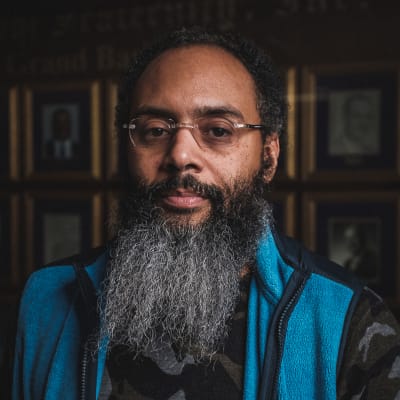The Plug hosted a live discussion with Rodney Sampson, 100 Black Angel general partner and the CEO of Opportunity Hub (OHUB), a startup and venture space leveling the playing field for the Black tech ecosystem. “We’re teaching [investors] how to operationalize racial equity in their company,” Sampson said, announcing a new investor training and certificate programs for Black and ally investors.
This interview has been edited for clarity and length.
Monica Melton: Explain how your work leading OHUB and as an investor at 100 Black Investors informs your investor certificate program.
Rodney Sampson: I’ve been in the tech startup and venture ecosystem for over 20 years. I started four companies over a 12 year period, two were big failures and two were acquired, one of which had an eight-figure exit. That opened up the door for my wife and me to go outside a traditional philanthropy model to address the outlier reality that we saw in the ecosystem.
That’s how Opportunity Hub was initially launched, and OHUB foundation, and the venture fund, which is what we make the majority of our investments from. I’m also a distinguished visiting professor at UNC Chapel Hill and Duke University, where we created two new certificate programs, where we’re teaching investors how to literally operationalize racial equity in their companies. It’s for leaders who run profit and loss (PnL) and control money.
The other course is 45 students, 95 percent of them are Black, and the majority are accredited investors and we’re teaching them how to invest in the Black tech ecosystem as an asset class versus as a charity.
MM: When you look back on measuring the progress of the work you’re able to do through this certification course, what are the factors you include for measuring its success?
RS: I’ll talk about how this all started. The Links Incorporated is the largest organization of affluent Black women and they made their first-ever investment in our fund as a limited partner. Word got out and women were asking us, ‘why didn’t I know about this’ or saying ‘I want to learn more’’ so the next step was educating people on the ‘why’ of investing in this asset class.
‘Why’ is important because we’ve seen more celebrities, athletes and influencers talk about how they’re investing in tech and startups and we get excited. But when you look at their portfolio of companies you’re like, ‘really?’. It’s like they’re from the culture but it doesn’t seem like they’re of, or for the culture, unless the culture is benefitting them economically.
MM: I wonder if a lot of new Black VCs may be acting as proxies for the existing venture capital system rather than increasing funding towards Black founders. What are the resources for Black GPs to learn about investing into syndicate funds that actually invest in Black investors and subsequent Black founders?
RS: That’s an incredible question. Most people are entering this asset class understanding that to be successful in the dominant system, you have to code-switch and play the proximity of whiteness game. A lot of investors that are Black that are coming out of dominant spaces have the mindset of white investors.
We’ve seen a lot of people get excited about allocating 10 percent of their round for Black people to invest. Is that really racial equity? Meanwhile, Black founders that are actually ready to raise can’t get folks excited about that.
In the certificate program, we teach folks the different ways to invest, be it equity crowdfunding, through a syndicate and where it falls into FCC offerings, how to invest in funds and ask the appropriate questions.
It’s sort of like racial equity versus FUBU (for us, by us).
Racial equity says let’s get more Black people operationalized in positions of power in the dominant structure, but time will tell. If we get thousands more [Black investors] working in VC will more capital come to funds, founders and families? We’ve got to have a for us, by us mindset.
MM: Why is it important for funds to be placed directly with Black investors to capitalize founders and solutions, instead of on their behalf?
RS: That plays into a particular investor’s investment thesis. If you are new at investing and or you don’t have the time, a fund is a passive way to learn how to invest, learn the ecosystem, but at the same time, begin to understand how to diligence deals without having to make the decision.
The concept of Black people investing in Black funds, founders, families in this particular niche of edge-tech or high growth companies, we’ve got to do all of it.
If you’re a founder thinking of how you raise, you may have to look at your capital stack. That capital stack may include some of your money, some credit, equity crowdfunding, a syndicate, a seed round and you have to navigate how to do all that at the same time.
As an investor you have to think about, where do I fit in based upon the discretionary capital that I have.
MM: Can you talk about regulation crowdfunding as a means and opportunity for more Black investors?
RS: I had an opportunity to address the Securities and Exchange Commission (SEC) last year, not too long after George Floyd’s murder and the same day that Kesha Cash was being appointed to the FCC small business investment committee so it was a day to celebrate.
There were two things on the table that day. There was the JOBS Act, which includes regulation crowdfunding, Title VII, which myself, Kim Wells and Jervis Huff advocated for and unofficially lobbied to get included in the JOBS Act, was diversity outreach.
Regulation CF was increased from $1 million to $5 million, originally we wanted $10 million. Reg A+, there are two Black people in the country that have done Reg A+, Dawn Dickson and Jay Morrison with Tulsa Real Estate Fund. Reg A+ now allows you to raise up to $75 million. A Reg A+ is almost like a mini IPO, it does require SEC approval without the same amount of paperwork.
Any investor accredited or not can participate in Reg CF or Reg A+. The accredited investor rules were modernized last year. It wasn’t perfect but it was a step forward and it opened things up for people who had certain licenses to become accredited investors.
If you think about that in the context of Black people, the National Association of Securities Professionals, a Black association, or National Association of Black Accountants, they’re all accredited now.
MM: Any closing thoughts?
RS: Only one to two percent of 40 million Black Americans are considered accredited investors, we could galvanize 100 or 1,000 of those people and get to the point where we’re literally funding a seed round for a Black company every day. We have to expose people to the Black tech ecosystem as an asset class.








